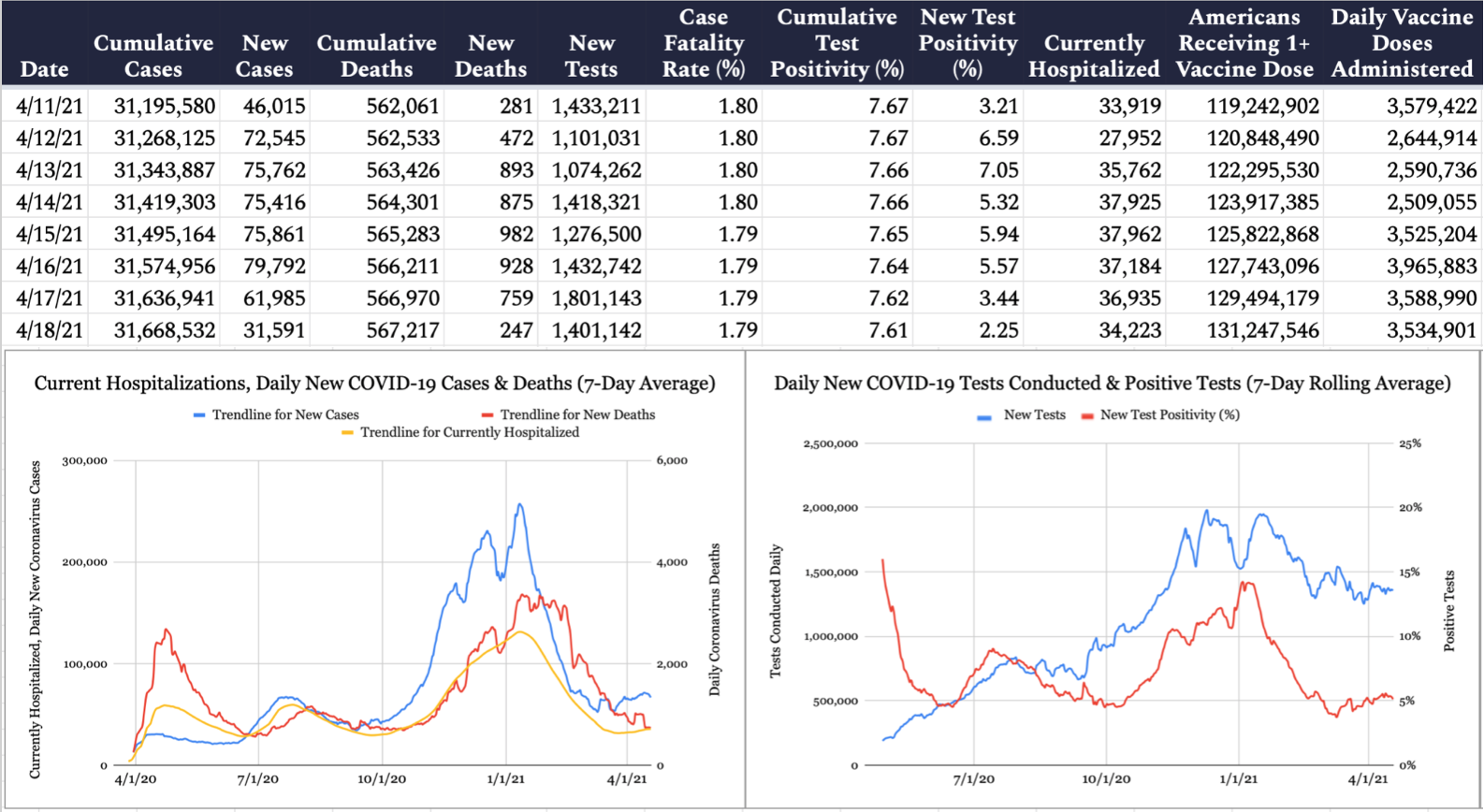Happy Monday! All adults 18 and older should be eligible to make a COVID-19 vaccine appointment beginning today—nationwide! Go get that shot if you haven’t already!
Quick Hits: Today’s Top Stories
-
The Kremlin retaliated against the Biden administration’s new sanctions on Friday, expelling 10 American diplomats from Russia and blacklisting eight current and former U.S. officials—including John Bolton and Susan Rice—from entering the country.
-
A 19-year-old gunman killed eight people at a FedEx facility in Indianapolis late last week, injuring several others. The gunman, who killed himself after the shooting spree, was a former FedEx employee and had documented mental health issues. A combined six people were killed in shootings in Kenosha, Wisconsin and Austin, Texas over the weekend as well.
-
A Hong Kong court on Friday sentenced Jimmy Lai—activist and founder of the Apple Daily newspaper—to 14 months in prison for his participation in pro-democracy protests in August 2019. Four other pro-democracy activists were sentenced as well.
-
The Biden administration on Friday reversed the Trump administration’s restrictions on federally funded medical research that uses fetal tissue obtained from abortions.
-
Dr. Anthony Fauci said yesterday he expects the nationwide pause on Johnson & Johnson’s COVID-19 vaccine to be lifted by Friday, adding he believes the country “will continue to use it in some form.”
-
The United States confirmed 31,591 new cases of COVID-19 yesterday per the Johns Hopkins University COVID-19 Dashboard, with 2.3 percent of the 1,401,142 tests reported coming back positive. An additional 247 deaths were attributed to the virus on Sunday, bringing the pandemic’s American death toll to 567,217. According to the Centers for Disease Control, 34,223 Americans are currently hospitalized with COVID-19. Meanwhile, 3,534,901 COVID-19 vaccine doses were administered yesterday, with 131,247,546 Americans having now received at least one dose.

Biden’s Refugee Cap Rollercoaster
Whether you agree or disagree with the actions the Biden administration has taken in its first 90 days, it’s hard to argue that the process underlying those actions hasn’t been consistent and organized. On pretty much every major policy rollout thus far, the White House and Democratic Party have presented a united front: Detailed fact sheets, presidential speeches, and designated advocates hitting the airwaves to sell their plans to the American public.
But that has changed in recent days, with the White House scrambling to cobble together a coherent message on refugee admissions, then ultimately caving to public pressure and reversing course.
Over the past four years, the Trump administration systematically reduced the United States’ annual refugee admissions cap to historic lows, citing security concerns for doing so. In fiscal year 2016, the Obama administration set the cap for refugee admissions at 85,000; the Trump administration’s 2020 limit (set in September 2019, prior to the pandemic) was just 18,000. Last October, the White House announced plans to cut that number even further in 2021, to 15,000, if Trump won reelection.
At the time, Biden thwacked Trump over the decision. “President Trump’s decision to close America’s doors to refugees fleeing persecution is cruel and shortsighted,” he tweeted just days before the election. “As president, I will restore America’s historic commitment to welcoming those whose lives are threatened by conflict and crisis.” His campaign website claimed he would “set the annual global refugee admissions cap to 125,000, and seek to raise it over time commensurate with our responsibility, our values, and the unprecedented global need.”
Biden reiterated that promise as president, in a speech delivered at the State Department on February 4.
“We also face a crisis of more than 80 million displaced people suffering all around the world. The United States’ moral leadership on refugee issues was a point of bipartisan consensus for so many decades when I first got here,” the president said, announcing an executive order that would allow him to raise the refugee cap to 125,000 in the first full year of his administration. “It’s going to take time to rebuild what has been so badly damaged, but that’s precisely what we’re going to do.”
But as the weeks turned into months, Biden never actually signed the designation lifting the cap—and the White House refused to say why. Press secretary Jen Psaki was asked point blank to provide a rationale for the holdup multiple times last week, and each time she deflected: “The president remains committed to raising the refugee cap, and I can assure anyone who has concerns that that remains the case,” she said Thursday. “But I don’t have an update on the timeline of the signing.”
Things came to a head Friday, just a few days after an International Rescue Committee report found that Biden was on pace to admit just 4,510 refugees this fiscal year—the fewest of any president in history. Just before 3 p.m. ET, the White House issued a presidential memorandum extending Trump’s 15,000-refugee cap, saying it “remains justified by humanitarian concerns and is otherwise in the national interest.”
“Should 15,000 admissions under the revised allocations for FY 2021 be reached prior to the end of the fiscal year and the emergency refugee situation persists, a subsequent Presidential Determination may be issued to increase admissions, as appropriate,” the memo continued.
The backlash from progressives was swift and fierce. “It is simply unacceptable and unconscionable that the Biden Administration is not immediately repealing Donald Trump’s harmful, xenophobic, and racist refugee cap that cruelly restricts refugee admissions to a historically low level,” Rep. Pramila Jayapal said. Sen. Ed Markey called the policy “cruel regardless of the administration,” adding that he will be “demanding answers” from the White House. Jenny Yang of the Christian humanitarian nonprofit World Relief said Biden had “broken his promise” and “abandoned his commitment” on these issues.
The White House was paying attention, and quickly tried to clean up the mess on its left flank. Less than two hours later after the initial memorandum, Psaki issued a press release acknowledging Biden’s announcement had “been the subject of some confusion.”
Meeting Biden’s goal of 62,500 refugees admitted by October 1 was determined to be “unlikely,” she claimed, because the refugee admissions program had been decimated under the Trump administration (there is some truth to this; more than 100 resettlement offices were closed and lots of support staff were let go or reassigned). But she added that the president will issue a “final, increased refugee cap” for the remainder of FY 2021 by May 15.
After finishing up a round of golf on Saturday, Biden himself pledged to reporters that he’s “going to increase the number.”
“The problem was that the refugee part was working on the crisis that ended up on the border with young people,” he said. “We couldn’t do two things at once.”
Although it’s easy to conflate the two, the refugee admission process is wholly separate from the processing of asylum claims on the southern border. Participants in the former must be referred to the U.S. Refugee Admissions Program, apply for admission into the United States (demonstrate they are/were being persecuted due to their race, religion, nationality, etc.), and remain in their home country until they are vetted and approved. The process, for many, takes years.
The Washington Post reported last week that some in the White House were concerned with how raising the refugee cap would play politically given the administration’s early stumbles with immigration. Biden’s approval rating on that issue lags behind the rest, and former President Trump spent years claiming the United States’ refugee screening process was not stringent enough, leaving room for would-be terrorists to slip through the cracks.
But there are tens of millions around the globe who could benefit from what President Ronald Reagan in 1981 deemed the United States’ “responsibility of welcoming and resettling those who flee oppression,” and thousands—if not millions—for whom it is a matter of life or death.
“As the CCP is committing egregious human rights violations, including genocide and crimes against humanity, urgent action is needed to end the atrocities and assist Uyghurs and others facing persecution in Xinjiang,” Sen. Marco Rubio said last week, introducing a bipartisan bill with Sen. Chris Coons that would prioritize Uyghur Muslims for refugee processing.
“To effectively compete with China,” Coons added, “we must be the best version of ourselves, including by living our values and welcoming those who have been unjustly imprisoned in or forced to flee Xinjiang.”
Navalny in Dire Straits
After 76 days in a Russian prison and 21 days on a hunger strike, President Vladimir Putin’s foremost political rival—Alexei Navalny—is in critical condition. In a letter addressing the head of Russia’s penitentiary service Saturday, the opposition leader’s team of doctors wrote that Navalny could “die within the next few days” if denied immediate medical service.
Navalny, who was convicted earlier this year on trumped-up charges, has barely scratched the surface of his 32-month sentence at Pokrov’s infamous Penal Colony No. 2. But in a dire effort to seek independent medical treatment for severe back pain and loss of feeling in his limbs, Navalny launched a hunger strike late last month. Together with neglect and maltreatment from prison guards, the effort has led to further deterioration of his health.
“Navalny has had to take some of these more dramatic steps to make sure he can continue to keep the authorities’ attention in the hopes that he can receive the medical care he needs, but the authorities are just not going to give into a lot of his demands,” said Heather Conley, the director of the Europe, Russia, and Eurasia Program at the Center for Strategic and International Studies. “It’s a pretty tough situation.”
In an interview with the BBC filmed Friday, Russia’s ambassador to the U.K. said that Navalny “will not be allowed to die in prison,” but “behaves like a hooligan absolutely in trying to violate every rule that has been established.”
As his blood potassium level climbs to 7.1 millimoles per liter, physicians warn that Navalny could experience life-threatening cardiac arrest or kidney failure at any minute. Rather than granting their prisoner emergency care, the administration has threatened to force-feed him using a “straightjacket and other joys,” Navalny’s Instagram read.
In the same post, Navalny alleged that Moscow has thus far denied him access to civilian physicians for fear they would connect his loss of feeling to his August poisoning. The politician’s near-fatal exposure to Novichok, a Soviet-era nerve agent, has been credibly linked to operatives working directly on behalf of Putin.
Widespread protests broke out in January and February of this year in opposition to Navalny’s sentencing, but were swiftly and brutally extinguished by Russian security forces. With the opposition leader’s life now on the line, his lawyers are calling on supporters to take to the streets again on April 21. “The life of Alexei Navalny and the fate of Russia depend on how many citizens take to the streets that day,” they wrote via Instagram.
But for the average Russian citizen, updated information on Navalny’s condition is hard to come by. And while the international community has sought to fill the gap, there are few proactive steps that can be taken by outside spectators.
“We have communicated to the Russian government that what happens to Mr. Navalny in their custody is their responsibility and they will be held accountable by the international community,” Jake Sullivan said Sunday on CNN’s State of the Union. “In terms of the specific measures that we would take, we are looking at a variety of different costs that we would impose, and I’m not going to telegraph that publicly at this point.”
“It’s totally, totally unfair,” President Biden said of Navalny’s treatment on Saturday. “Totally inappropriate.”
Worth Your Time
-
Some profiles are just too fascinating not to share, and Rachael Aviv’s New Yorker profile of psychologist and memory expert Elizabeth Loftus is one of them. Loftus’s groundbreaking work revolutionized how we think about memory—not as pristine snapshots of events we witnessed, but as fallible sense-perceptions into which new errors can be introduced through our very act of remembering them. In the closing decades of the 20th century, her work raised serious questions about criminal convictions based solely on eyewitness testimony—and eventually made her a pariah in some circles after she became a high-profile witness for such cultural villains as Harvey Weinstein, Jerry Sandusky, and Bill Cosby. In other words, she’s a fascinating person. But Aviv offers a particularly fascinating piece by digging not just into Loftus’s work, but also what set her on her career path—an investigation that involves Loftus’s family’s own possibly fallible attempts to reconstruct key events in their own lives. It’s impossible to do it justice here—just go read it!
-
Writing at Reason, Jacob Sullum digs into some of the data surrounding mass shootings: Why do they tend to come in clusters, and what can be done—either as a matter of public policy or from a media coverage standpoint—to prevent one tragedy from inspiring others? Speaking to a wide array of criminologists and sociologists, Sullum surveys the debate around the so-called “copycat theory” and argues that media organizations should strive not to sensationalize tragedies in a variety of ways.
Presented Without Comment
Also Presented Without Comment
Also Also Presented Without Comment
Toeing the Company Line, Lightning Round
-
Last week was a big foreign policy week, so naturally Thomas Joscelyn published not one, but two Friday Vital Interests: One critiquing President Biden’s public rationale for withdrawing all U.S. troops from Afghanistan, and another explaining why the supposed intelligence that Russia had offered the Taliban bounties for U.S. troops had always been murkier than media coverage made it seem.
-
In Friday’s Uphill (🔒), Haley surveyed congressional reactions to the Afghanistan news and dug into a bipartisan Senate group’s scheme for a somewhat more modest infrastructure package than the one Democrats proposed.
-
On Friday’s Dispatch Podcast, Sarah and David interviewed author Kristin Du Mez about the intersection of masculinity and evangelical politics.
-
Jonah’s Friday G-File ruminates on what he describes as American progressives’ simultaneous avowed love for raw majoritarianism and minority-priority politics: “Telling people that majorities should have no impediment to implementing their political desires while also telling people that it’s right and noble to organize for the betterment of your racial identity seems like a fraught gamble,” he argues.
-
David’s Sunday French Press surveys Christian attitudes toward politics from the standpoint of a fundamental ontological question: Are the biggest threats to Christians’ faith external, or do they come from within the Church?
-
On the site today, Chris Stirewalt explains how Biden’s missteps on the refugee caps demonstrate a rift over immigration among different factions of the Democratic party.
-
Danielle Pletka has a long but informative interview with Russian opposition figure Vladimir Kara-Murza. He discusses his political awakening as a child, details some of the Putin regime’s worst power grabs, and—as someone who was poisoned nearly to death not once but twice—talks about Alexei Navalny’s situation.
Let Us Know
Now that half of all U.S. adults (and nearly all of your Morning Dispatchers!) have had at least one COVID-19 vaccine dose, are you optimistic that life will return to normal this summer? Are people in your local community expressing vaccine hesitancy after last week’s nationwide pause on Johnson & Johnson?
Reporting by Declan Garvey (@declanpgarvey), Andrew Egger (@EggerDC), Haley Byrd Wilt (@byrdinator), Audrey Fahlberg (@FahlOutBerg), Charlotte Lawson (@charlotteUVA), Ryan Brown (@RyanP_Brown), and Steve Hayes (@stephenfhayes).






Please note that we at The Dispatch hold ourselves, our work, and our commenters to a higher standard than other places on the internet. We welcome comments that foster genuine debate or discussion—including comments critical of us or our work—but responses that include ad hominem attacks on fellow Dispatch members or are intended to stoke fear and anger may be moderated.
You are currently using a limited time guest pass and do not have access to commenting. Consider subscribing to join the conversation.
With your membership, you only have the ability to comment on The Morning Dispatch articles. Consider upgrading to join the conversation everywhere.